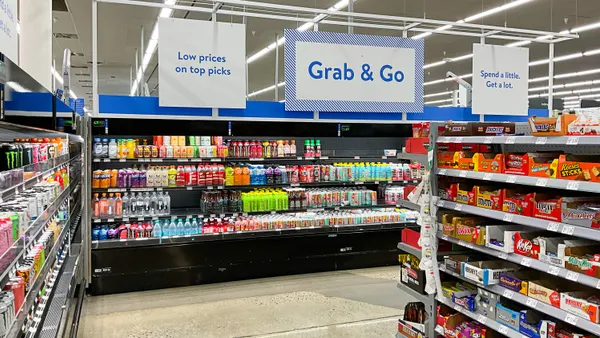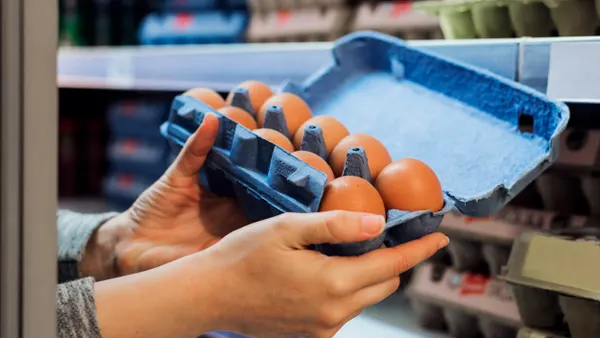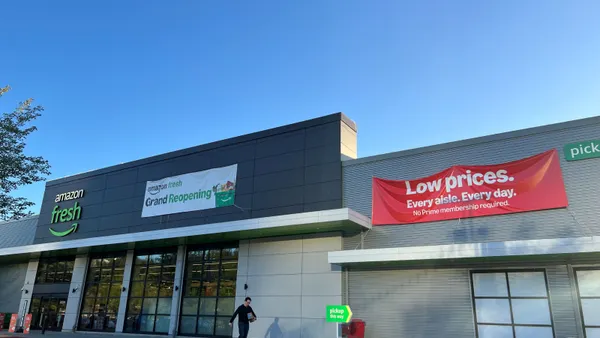ANAHEIM, California — More than 90,000 people traveled to California last week for the annual five-day exhibition of the latest products in the natural and organic industry.
This year’s Natural Products Expo West spread across several buildings as thousands of exhibitors launched new products and discussed what’s next for food and beverages.
Several trends clearly stood out at this year's show. Heightened enthusiasm for hemp and CBD; plant-based products; regenerative agriculture; and more brands touting their paleo and keto focus were topics of conversation on the floor and among panelists speaking at the event.
Company executives representing these segments said 2019 will be a year of growth as they hit more mainstream stores and garner attention through social media and e-commerce. Food Dive attended Expo West and spoke with people and businesses at the forefront of these shifts in food consumption. Here's what we learned.
1. CBD and hemp innovation
Although there are more regulatory hurdles ahead, companies said the passage of the Farm Bill helped provide more clarity for hemp and CBD-infused products.
Booths on almost every floor at the show touted their hemp and CBD ingredients. As big food makers keep a close eye on the trend, smaller companies have a head start with products already on the market.
Last month, Tilray, a producer and distributor of cannabis, bought Manitoba Harvest, the world’s largest hemp foods manufacturer, for $317 million. Manitoba Harvest founder Mike Fata said in an interview the recent legislation paved the way for more businesses to enter the space and potentially thrive.
"It's seen more as an opportunity, both from a revenue standpoint and from a brand standpoint, and just really for other companies to align their mission to that instead of seeing it as a liability and a risk, which up until really 2018 that's how big food companies saw it," Fata told Food Dive.
The retail value of all U.S. hemp products last year was estimated at $820 million, according to the Agricultural Marketing Resource Center. New Frontier Data estimated that in 2017 alone, the entire U.S. CBD industry jumped nearly 40%, growing to $367 million in sales.
"Just like any other category or product line, we have to have enough critical mass to make it a destination within a retail location. We want really good complementary products to what we are doing to come in."

Matt Oscamou
Co-founder, Weller
Weller, a company that makes CBD-infused food and beverages, introduced a new CBD sparkling water line at the show. Matt Oscamou, co-founder of Weller, told Food Dive his company has seen dramatic growth during the last year. He said increased competition has benefited his company by giving more exposure to CBD.
"Just like any other category or product line, we have to have enough critical mass to make it a destination within a retail location. We want really good complementary products to what we are doing to come in," Oscamou said. "We want to be able to be that captain of the category and help bring the right folks around to really deliver great products that are effective, reliable and made appropriately."
Even brands that aren't originally hemp or CBD companies are introducing products with the ingredient. Base Culture, which makes paleo almond butter and brownies, unveiled CBD-infused brownies at Expo West. Gabby Nahle, a spokesperson for Base Culture, told Food Dive the company is a healthy, active lifestyle brand that aims to give consumers products they are looking for.
"If the consumer wants CBD, we want to find a way to naturally implement that into our products," Nahle said.
2. Plant-based everything
From beverages and yogurt to a variety of snacks, plant-based products continue to dominate the industry.
Although this is not a new trend, companies that sell plant-based items said last week that more people are open to trying these innovations. At the same time, an increasing number of retailers are putting the products on shelves.
Kite Hill CEO Rob Leibowitz told Food Dive his business of plant-based yogurt, cream cheese and pasta is quickly growing. He said business nearly doubled in 2018 with similar expansion forecast this year. He partially attributes the increase to the fact that major retailers such as Target, Whole Foods and Safeway have made Kite Hill products more accessible to the consumer in their stores.
"I would characterize the growth over the last year as really driven, first and foremost, by heavy consumer appetite for great-tasting food that happens to be plant based," he said. "The other enabling part for us in growth is just the unbelievable retail acceptance of our product at a time when plant based is really important to culture. The retailers are really embracing it and putting us on store shelves in locations that our consumers can easily find."
According to research from Nielsen, 39% of U.S. consumers were actively trying to add more plant-based foods to their diets in 2017.
"What we know about the role of burger is that often it's kind of your gateway into eating plant based. If we provide something that's super indulgent and delicious, but you also know it's 100% plant based and you can feel good about it, I felt like that's such a win-win for us and for the category."

Melissa Cash
Head of global marketing, strategy and innovation for plant-based protein and natural brands, Kellogg
At Expo West, Kellogg's MorningStar Farms launched a vegan "Cheezeburger" and vowed to transition to completely plant based and vegan by 2021. Melissa Cash, head of global marketing, strategy and innovation for plant-based protein and natural brands at Kellogg, told Food Dive this launch came about after talking to consumers.
"What we know about the role of burger is that often it's kind of your gateway into eating plant based," she said. "If we provide something that's super indulgent and delicious, but you also know it's 100% plant based and you can feel good about it, I felt like that's such a win-win for us and for the category."
But it's not just plant-based burgers and yogurt that are gaining traction, snacks are too. Arnulfo Ventura, CEO of Beanfields, said in an interview that January was its highest-selling month in company history. He said people are becoming "more globally minded about plant based and what that means on the environment."
Ventura said his company is attracting people to the brand who previously "didn’t have a reason to go down the salty, snack aisle because there was nothing there that really spoke to them."
3. Regenerative agriculture promises
Another theme popular among Expo West exhibitors was regenerative agriculture, with food companies such as General Mills using the show as a platform to make big announcements.
General Mills committed last week to using regenerative agricultural methods on 1 million acres of farmland by 2030. As more consumers value sustainable practices, companies are taking notice and incorporating this into the brands they sell.
The booth for General Mills showcased a massive sign with its new goal and focused on telling how the cereal and snacks maker would transform farms to regenerative agriculture. Shauna Sadowski, head of sustainability for natural and organics at General Mills, told Food Dive everyone needs to be thinking bigger about the footprint of agriculture and ways that its impact can be minimized.
"It's a big deal for food companies because we make food that relies on agriculture. When we think about what we need to be doing and the fact that so much of the landscape is actually being degraded right now, it's an opportunity to do it differently," she said. "And that's what regenerative agriculture is about. It's about looking at how we not only do more with less or do less bad, but to actually restore and regenerate."
But General Mills isn't the only company adopting this philosophy. Hormel Foods' Applegate brand recently launched a line of pork sausages from small farms that use regenerative agricultural practices.
John Ghingo, president of Applegate, told Food Dive this product is its first foray into regenerative agriculture with more expected in the future.
"Absolutely for us as a brand that wants to be on the front edge of the industry, a very progressive and innovative force in the meat industry, we're definitely looking at environmental impacts, how we can be more sustainable, more regenerative and push in that direction," he said.
Last year, milk and yogurt producer Danone North America committed up to $6 million for regenerative agriculture and soil health research. Deanna Bratter, senior director of public benefit and sustainable development at Danone North America, told Food Dive that more companies are noticing the role agriculture has to play in reducing carbon.
"It's incredibly powerful as a sustainability professional and as a company focused on sustainability, that we're now implementing solutions not just to do less bad, but to really transform the trajectory that we're on when it comes to climate change."

Deanna Bratter
Senior director of public benefit and sustainable development, Danone North America
"This movement around regenerative agriculture is one of the first big efforts to actually not just reduce the emissions we're creating, but to draw down emissions that already exist," she said. "I think it's incredibly powerful as a sustainability professional and as a company focused on sustainability, that we're now implementing solutions not just to do less bad, but to really transform the trajectory that we're on when it comes to climate change."
4. Diet-boasting brands
Keto and paleo were prevalent throughout the show as more companies latched onto the diet trends that have surged in popularity with consumers.
Both diets are similar in that they focus on nutrient-rich foods and don't include grains, legumes or dairy. While consumers regularly gravitate to the latest diet fad before moving on to the next one, companies tied to keto and paleo said they have more staying power because there is a greater emphasis on taste.
Keto has been a financial boon for Simply Delish, a company that sells vegan, non-gmo, fat-free, sugar-free, gluten-free jello and pudding. Brandon Whitehead, marketing and social media manager for Simply Delish, told Food Dive that keto "fits perfectly with our model" and has been particularly attractive to customers on social media. He said sales have been nearly doubling each month.
Companies with the paleo label have seen a similar trajectory. Josh Francis, co-owner of Jack's Paleo Kitchen, told Food Dive that during the last six months, the company has increased its distribution. It now sells its chocolate chip and cinnamon raisin cookies in at least 42 states. Jack's Paleo Kitchen, which sells cookies that are nut, egg, dairy and grain-free, recently launched trail mix bites because of the success of its other products, he said.
"People are just tired of all these different health issues that are happening, and I think it is becoming more prevalent, and a lot of it has to do with the foods you are eating," Francis said of why the paleo diet has grown so popular.















